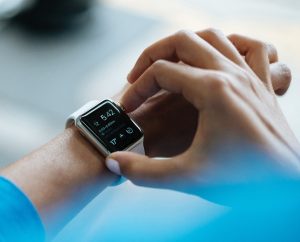Digital health: Breaking barriers in Health by Debashis Bhattacharya and Kamlesh Sheth
“We need to bring the exam room to where the patients are.” – Dr. Jay Sanders, telemedicine pioneer
The NHS was created in 1948 to provide state f unded universal care. This stood the test of time, but with
unded universal care. This stood the test of time, but with
an ageing population1 the focus has now shifted to the care of chronic diseases which accounts for 70%2 of the NHS spend. Almost3 1 in 2 people aged over 75, and 2 in 3 people aged over 85 have a limiting longstanding illness. Along with long-term multidisciplinary care, patients with chronic diseases are at greater risk of emergency department use and hospitalisation. Unsurprisingly, certain chronic conditions—like rheumatologic conditions, renal disease, diabetes, and AIDS—are associated with persistent high, long-term healthcare spending. The current increased stress on acute care and rigid divisions between acute and primary care is likely to worsen health outcomes and increase costs. In England alone, the NHS budget deficit4 is likely to be nearly £30 billion a year by 2020/21.
The crucial issue is to support patients to self-care and put them in control of their own conditions. A huge culture change is needed. People should be at the centre of decisions about their care, together with a spirit of innovation that embraces new technologies. Preventive, personalised, integrated and innovative approaches must become the norm to transform people’s lives and achieve better healthcare quality and productivity.
 The internet, followed by the mobile revolution has set us free from the confines of space. Along with bridging geographic boundaries, it is a treasure of information which has educated and empowered populations. Used in healthcare, this can provide remote5 education, consultation and monitoring of patients from a preventive and therapeutic aspect. The fast growing wearable technology industry has the potential to reshape human communication with the healthcare provider. This technology can empower people to interact with healthcare providers from the place of their choice. This will begin to erase the boundaries between primary and secondary healthcare and improve health in communities. Resources can be diverted appropriately – and a more cost efficient NHS can be developed.
The internet, followed by the mobile revolution has set us free from the confines of space. Along with bridging geographic boundaries, it is a treasure of information which has educated and empowered populations. Used in healthcare, this can provide remote5 education, consultation and monitoring of patients from a preventive and therapeutic aspect. The fast growing wearable technology industry has the potential to reshape human communication with the healthcare provider. This technology can empower people to interact with healthcare providers from the place of their choice. This will begin to erase the boundaries between primary and secondary healthcare and improve health in communities. Resources can be diverted appropriately – and a more cost efficient NHS can be developed.
There may be potential teething issues of security breaches, but these can be overcome. The government, military and banks already continue to make our lives better using mobile internet. There is of course a cultural change6 that will be needed in both clients and providers alike and of course, appropriate training and legal support will be needed.
Mobile health can help us build more caring communities not limited by geographical barriers. It will also go a long way in addressing the NHS budget deficit.
References:
-
http://www.kingsfund.org.uk/time-to-think-differently/trends/demography
-
https://www.gov.uk/government/publications/long-term-conditions-compendium-of-information-third-edition
-
http://www.ageuk.org.uk/Documents/EN-GB/Factsheets/Later_Life_UK_factsheet.pdf?dtrk=true
-
https://www.england.nhs.uk/wp-content/uploads/2014/10/5yfv-web.pdf
-
http://www.aegleio.com/blog/if-tomorrow-comes
-
http://www.aegleio.com/blog/october-07th-2015
Authors:
This post was co-written by the founding directors of Aegleio:
Debashis Bhattacharya worked as a surgeon for two decades in India and ?the ?UK before moving into the pharmaceutical industry where he has worked with Novo Nordisk, Abbott and Eli Lilly. He is trained in Health Economics at the University of Oxford, Healthcare Innovation at the Harvard Business School and Digital Medicine at the Rice University. He is a keen researcher and entrepreneur.
Kamlesh Sheth is a physician with over 25 years of experience in healthcare, including within clinical medicine, academic research, pharmaceutical & the med-tech industry and healthcare entrepreneurship. His interests span orphan and ultra-orphan diseases, medical devices and digital healthcare. He has experience working across the world in Asia, Europe and the USA.
3 thoughts on “Digital health: Breaking barriers in Health by Debashis Bhattacharya and Kamlesh Sheth”
Comments are closed.




All that you say here is very much doable without a great deal of effort.
We just need to look 360 degrees to find how other professions (at implementation level) have embraced technology and that will be inspiration enough for the Medico profession to follow suit.
Well done on a nicely written very succinct article.
Thanks Pallab for your comment and raising a very important point. mHealth continues to be inspired by the banking, military and government sectors especially with reference to security issues. However, in medicine, one needs to be careful as to not be too intrusive in a person`s life and do everything to foster human-human engagement and relationships. The long term sustainability depends on how successful we are in building trust and communities that are supportive using technology.
Thanks for sharing! This will be a new and a faster way of communication using digital health technology.